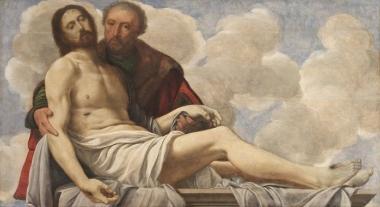Adult Object Lesson: Jesus’ View of Jerusalem (Luke 13:31-35)
The people of Jerusalem:
Remembering Their Names
Today’s story is about the actions of a city. Jerusalem as a body of people is center stage.
Today’s “object” is the old children’s ditty that is meant to teach the meaning of “church.”
NOTE: The message can be taught to both children and adults, but they are likely to require different emphases. Adults need to ponder with maturity their actions within a group, while children are still learning the skills to act independently.
Here’s the children’s finger game:
Fold your hands with the fingers interlocking and bending over the back of your hand—the most traditional way.
Here’s the church.
Point your two index fingers skyward to make the church spire.
Here’s the steeple.
Spread your thumbs outward.
Open the doors. Where are the people?
There will be no people!
Now fold your hands with your fingers interlocking and bent inside the fold—toward the palms.
Repeat the poem.
Here’s the church. Here’s the steeple. Open the doors.
Now when you spread your thumbs outward. You can see the fingers.
Here are the people.
Today’s Gospel is leading us to think about the people of God as a group. Our actions, as a group, take on personality and power. We think of this as a good thing. It certainly is rooted in the Bible and God’s view of His creation. He names a Chosen People. They carry a lot of weight as such.
Jesus refers to his longing that the people of Jerusalem be gathered together under his protection, but they are unwilling.
When we think of God’s people today, we think of people who do good things and trust and obey God. We think of correct behavior as being found within the safety of numbers—no matter how often history proves this isn’t true.
Jesus starts out condemning Jerusalem, the City of Peace, from the start. They have a reputation, those Jerusalem folks. It is the city that turns on the prophets.
Jesus will ride into this city to the cheers of the people.
Jesus will walk out of the city to their collective scorn.
The path to this drama is foreshadowed in today’s text. We are privileged in reading it to know what is coming.
The people are given one opportunity after another to make things right—at every level of power—but collectively they just can’t muster the courage.
There is no guaranteed safety in numbers — even within the church. Collectively we can still do the wrong thing. In these moments, individuals in the church can shine. It is not easy and often the Church discourages it. They may succeed. Often, they do not.
That’s why saints are called by name.
They act as individuals within groups that are ethically or morally challenged. The problem may be isolated. The group generally may be good. But something about them, at one moment, just isn’t right.
Dietrich Bonhoeffer, for example, stood alone against the Nazis. Martin Luther King, Jr. raised his voice to a nation that wasn’t ready to hear him. Both were killed—one by an authorized group, the other by a lone gunmen who felt empowered by the sentiments of others.
Jesus will have just one person who steps from the crowd on the way to Calvary. Joseph of Arimathea will stand alone before Pilate as the people of Jerusalem assemble on the hill. He alone will not follow that crowd. He will be the one person in a large city to speak up—unafraid or afraid. He wasn’t part of the inner circle as far as we know—the properly vetted spokesman for Christ. He was one man acting without support of any organization. Many others know that what is going on is wrong. One will act.
We remember his name.

